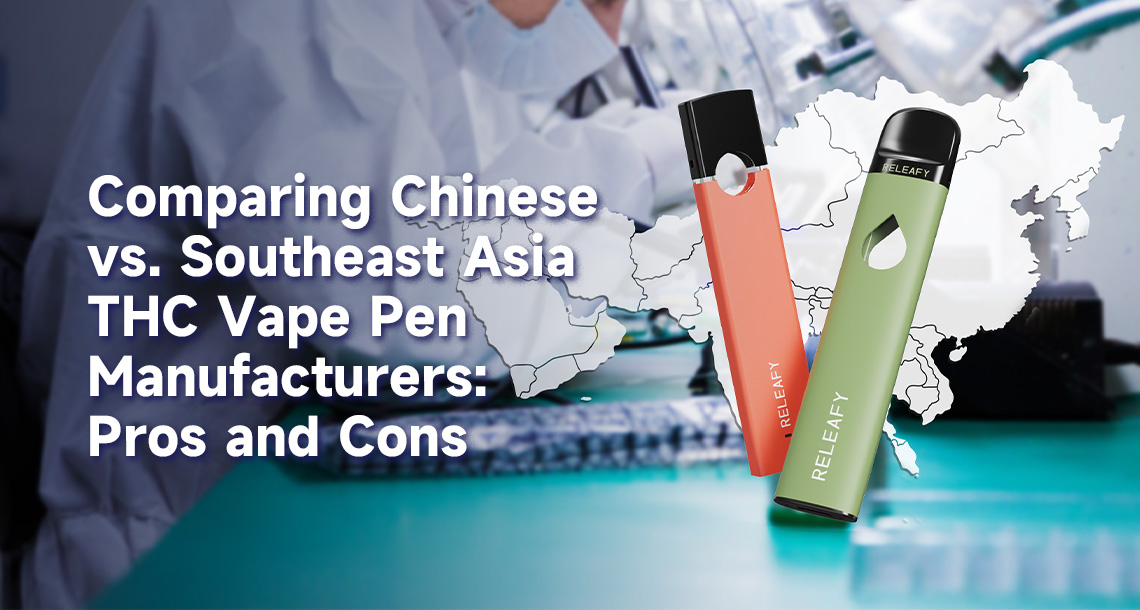
Customization Options: Tailoring THC Disposable Vape Pens with Chinese Manufacturers
September 22, 2023
Navigating the Last Quarter of 2023: How Vape Brand Buyers Preparing Your Business for 2024?
September 28, 2023
Customization Options: Tailoring THC Disposable Vape Pens with Chinese Manufacturers
September 22, 2023
Navigating the Last Quarter of 2023: How Vape Brand Buyers Preparing Your Business for 2024?
September 28, 2023
Comparing Chinese vs. Southeast Asia THC Vape Pen Manufacturers: Pros and Cons
In recent years, the global market for THC vape pens has experienced exponential growth, driven by the increasing acceptance of cannabis for medical and recreational use. As demand surges, vape brand wholesalers face crucial decisions in selecting the right vape pen manufacturer partner. Two prominent options are Chinese and Southeast Asian manufacturers, each with its set of advantages and disadvantages. In this blog, we’ll delve into key factors like raw material supply, labor cost, customization options and time, production time, shipping time, government policy, and product testing to help you make an informed choice.
Vape Pen Raw Material Supply
Chinese Manufacturers
Pros:
China boasts a robust supply chain for electronic components and materials, so manufacturers have easy access to a wide range of vape components and source materials such as batteries, coils, and cartridges at competitive prices.
Established relationships with suppliers ensure reliability.
Cons:
Quality control needs to be strict due to the diverse range of suppliers.
Southeast Asian Manufacturers
Pros:
Proximity to raw material sources, including rubber and plastics.
Easier access to sustainable materials.
Cons:
Limited variety of raw materials compared to China.
Limited experience and infrastructure for sourcing electronic components.
Smaller-scale production may result in higher material costs.
Potential for a more complex supply chain due to less regulation.

Labor Costs
Chinese Manufacturers
Pros:
Well-established manufacturing workforce with extensive experience in electronics.
This cost advantage allows them to offer competitive prices on their products.
Cons:
Rising labor costs in certain regions might erode some cost advantages.
Southeast Asian Manufacturers
Pros:
Generally lower labor costs compared to China.
Potential for a bilingual workforce that facilitates communication with international clients.
Cons:
The availability of skilled labor can vary between countries.
Skilled labor shortages in some countries may result in abnormal product quality.
Customization Options and Time
Chinese Manufacturers
Pros:
Vast experience in producing custom electronic products with a wide range of features. Chinese manufacturers often excel in providing a wide range of customization options, from design and branding to packaging.
Shorter lead times for product development due to extensive industry expertise.
Cons:
Minimum order quantities (MOQs) may be required for custom designs.
Southeast Asian Manufacturers
Pros:
Increasing flexibility and willingness to accommodate custom design requests.
Lower MOQs for smaller businesses and startups.
Cons:
Customization options may be limited compared to Chinese manufacturers.
Longer lead times for custom product development, especially for complex designs.

Production Time
Chinese Manufacturers
Pros:
Efficient production processes and infrastructure can result in shorter production times.
Capacity to handle large-scale production orders.
Cons:
Peak demand periods can lead to production delays.
Southeast Asian Manufacturers
Pros:
Smaller manufacturers may offer quicker turnaround times for smaller orders.
More focused attention on individual projects.
Cons:
Limited capacity for large-scale production.
Longer lead times for complex projects.
Shipping Time
Chinese Manufacturers
Pros:
Well-established logistics networks for international shipping.
Multiple shipping options are available for different timeframes.
Cons:
Potential for shipping delays during peak seasons or unforeseen circumstances.
Southeast Asian Manufacturers
Pros:
Proximity to global markets can lead to shorter shipping times.
Lower shipping costs for nearby regions.
Cons:
Limited shipping options for long-distance exports.
Infrastructure may not be as well-developed in some areas.
Vape Pen Government Policies
Chinese Manufacturers
Pros:
Relatively stable regulatory environment for electronics manufacturing.
Strict enforcement of quality standards and intellectual property protection.
Cons:
Stringent cannabis-related regulations limit vape product testing.
Southeast Asian Manufacturers
Pros:
The evolving regulatory landscape may offer opportunities for cannabis-related products.
Fewer restrictions on product diversification.
Cons:
Uncertainty and potential regulatory changes can impact long-term planning.
Vape Pen Testing
Chinese Manufacturers
Pros:
Access to advanced testing facilities and expertise.
Strict adherence to quality control standards, and complete equipment for inspection.
Cons:
Limited experience with THC vape pen testing due to legal constraints.
Southeast Asian Manufacturers
Pros:
Growing expertise in cannabis product testing.
More familiarity with local cannabis strains and their properties.
Cons:
Potential variations in testing standards and practices between countries.
Conclusion
Choosing the right manufacturer for your THC vape pen business involves carefully considering a multitude of factors. Chinese manufacturers offer established supply chains and extensive production experience in electronics but face limitations due to stringent cannabis regulations. On the other hand, Southeast Asian manufacturers may provide advantages in terms of cannabis oil vape pen testing and lower labor costs, but they might have limited experience in raw material purchasing and customization.
Ultimately, the choice between Chinese and Southeast Asian THC vape pen manufacturers should align with your specific business needs and priorities, considering factors like customization requirements, production volume, and your long-term vision for the cannabis industry. Thorough research and due diligence are crucial to making an informed decision that will set your business on the path to success in this dynamic market.